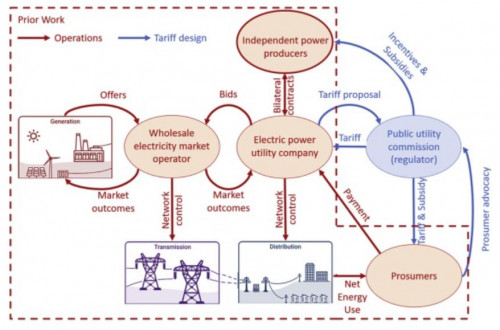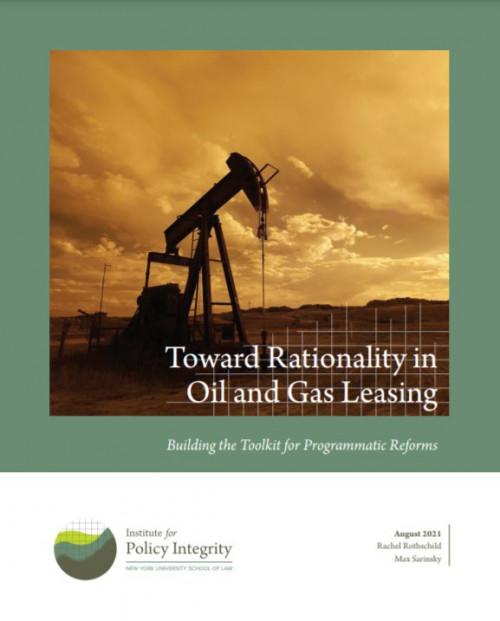-
Comments to FERC on the North Baja Xpress Project
The North Baja XPress Project would provide a significant increase in natural gas compression and transportation, potentially resulting in 9.5 million metric tons or more in downstream greenhouse gas emissions. The Federal Energy Regulatory Commission, however, failed to estimate the project’s total emissions and climate damages. In October 2020, we submitted comments recommending that FERC consider the full range of upstream and downstream emissions and contextualize their impacts using the social cost of carbon.
In our August 2021 follow up letter responding to FERC's draft environmental impact statement for the project, we note that the Commission has taken the helpful steps of quantifying direct and downstream emissions, but should still quantify upstream emissions, assess the project's incremental environmental harms, and consider avenues to mitigate emissions.
-
Comments to FERC on East 300 Upgrade Project
The East 300 Upgrade Project could result in the emission of over 2.3 million tons of downstream emissions in carbon-dioxide equivalence per year from the combusion of natural gas. In March, we submitted comments encouraging the Federal Energy Regulatory Commission to provide a more complete analysis of project emissions and weigh its climate impacts using the social cost of carbon. In August, we followed up with a comment letter regarding the Commission's continued failures to meaningfully assess climate impacts in the project's Draft Environmental Impact Statement.
-
Comments to FERC on PJM MOPR Reform
We submitted comments to the Federal Energy Regulatory Commission (FERC) encouraging the agency to accept PJM’s proposed changes to the Minimum Offer Price Rule, which recognizes that generation-based externality payment for clean electricity resources can be welfare-enhancing, and removes the artificial barrier to market entry for resources that receive payments under state climate policies created by the previous rule.
-
Modeling Strategic Objectives and Behavior in the Transition of the Energy Sector to Inform Policymaking
in The Electricity Journal
The typical starting point and centerpiece of energy decarbonization is the electric power sector, a large direct GHG emitter. Published in The Electricity Journal, this paper explores what the modeling community should do to inform this transition, including expanding energy market datasets and designing models that incorporate multiple objectives and manifold actors behaving strategically in a framework consisting of large uncertainty, while accounting for the physics of power systems.
-
Comments to FERC on the East Lateral XPress Project
The East Lateral XPress Project could result in the emission of over 3.6 million tons of downstream emissions in carbon-dioxide equivalence per year from the combustion of natural gas. We submitted comments (April 2021) and a follow-up letter (August 2021) encouraging the Federal Energy Regulatory Commission to provide a more complete analysis of project emissions, weigh its climate impacts using the social cost of carbon, and consider mitigation measures.
-
Comments to ONRR on Its New Proposal to Rescind Trump-Era Valuation Rule Repeal
In June 2021, the Department of the Interior’s Office of Natural Resource Revenue's (ONRR) proposed a rule rescinding a Trump-era repeal of the Valuation Rule. This rule sought to ensure that states and the federal government receive the full value of royalties due under the law for oil, gas, and coal extracted from public land. We submitted comments supporting ONRR’s proposal to fully rescind the 2020 Rule and encourage ONRR to further elaborate upon its reasons for fully withdrawing the 2020 Rule, in contrast to other alternatives. We lay out several key provisions in the 2020 Rule where ONRR can expand upon its justification for rescinding.
This comment letter follows a long line of advocacy that we've made opposing the Trump-era rule and supporting the valuation processes that it rescinded.
-
Comments to FERC on Marcus Hook Project
The Federal Energy Regulatory Commission has granted the Marcus Hook Compression Project Limited Notice to Proceed with the first phase of construction activities, which is currently underway. Our recent comments on FERC's draft environmental impact statement for the project recommend that the agency improve its consideration of climate impacts. It can do so by quantifying upstream emissions, assessing the project’s incremental climate harms, and considering avenues to mitigate its greenhouse gas contributions.
-
Comments to FERC on LNG Compression Project in New York
Iroquois Gas Transmission System’s Enhancement by Compression Project would provide a significant increase in natural gas compression and transportation, potentially resulting in over 2.4 million metric tons in downstream greenhouse gas emissions. The Federal Energy Regulatory Commission, however, failed to estimate the project’s total emissions and climate damages. We submitted comments recommending that FERC consider the full range of upstream and downstream emissions and contextualize their impacts using the social cost of carbon.
-
Comments to DOE on Manufactured Housing Energy Conservation Standards
The Department of Energy (DOE) has issued a notice of intent to prepare an environmental impact statement for energy conservation standards for manufactured housing. We submitted comments urging DOE to use the social cost of greenhouse gas metric whenever it analyzes the effects of greenhouse gas emissions, whether in a regulatory impact analysis, environmental impact statement, or other decisionmaking process.
-
Toward Rationality in Oil and Gas Leasing
Building the Toolkit for Programmatic Reforms
Leasing public lands and waters for fossil-fuel extraction drives a quarter of U.S. carbon dioxide emissions. Our new report offers analytic tools for federal leasing decisions to drive policies that maximize economic and environmental welfare—nationally and locally.





